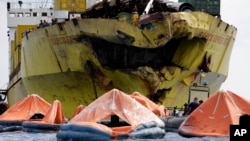MANILA —
Philippine officials say at least 38 people - including children - have died and 82 remain missing in the aftermath of a collision between a ferry and a container ship Friday night. Search and rescue efforts continue as leaking oil spreads from the sunken ferry.
The Philippine Coast Guard says search and rescue work will be downgraded to recovery and retrieval of bodies once 48 hours have passed from the time of the accident.
Central Philippines Coast Guard Commander Weniel Azcuna says divers are having a hard time getting inside the M-V St. Thomas Aquinas, which sank within minutes of the collision.
“As we speak now, the winds and the waves [are] quite strong here at the scene of the sunken vessel,” Abaya said.
Monsoon rains combining with a typhoon in the extreme north of the country are to blame.
Azcuna says the bad weather has also hampered efforts to contain oil leaking from the Aquinas, which has a fuel capacity of 120,000 liters. He says a contractor is using a chemical dispersant on the oil.
The Aquinas was heading for a stop in Cebu City in the central Philippines, before going on to Manila when the Sulpicio Express 7 cargo ship hit it. Officials say the two vessels were passing each other in a 550-meter-wide shilling channel off Talisay Town, near Cebu.
The Aquinas was carrying approximately 830 passengers and crew. Its manifest included scores of infants and children.
2Go Group, which owns the Aquinas, says upon impact the vessel's crew ordered everyone to “abandon ship” and handed out life vests. Survivors say hundreds jumped overboard and local fishermen helped rescue some of them.
Coast Guard officials had said the investigation would start once search and rescue operations were completed.
However, Transportation Secretary Joseph Emilio Abaya says his department’s maritime industry regulating body already issued fleet-wide suspensions of safety certificates for both shipping lines.
Abaya says the official investigation is expected to begin within a few days, and depending on findings, whomever is at fault could see a “full range of penalties.”
“It goes from suspension of license, cancellation of license, cancellation of the certificate of public convenience (government approval to run a passenger or cargo franchise), or [its] suspension for a certain period, before operation again,” Abaya said.
The Philippines, made up of more than 7,100 islands, is notorious for shipping mishaps caused by bad weather, poorly maintained fleets and lax enforcement of regulations.
In 1987, the M-V Doña Paz ferry and an oil tanker collided in bad weather, also in the central Philippines, killing more than 4,300 people.
The Philippine Coast Guard says search and rescue work will be downgraded to recovery and retrieval of bodies once 48 hours have passed from the time of the accident.
Central Philippines Coast Guard Commander Weniel Azcuna says divers are having a hard time getting inside the M-V St. Thomas Aquinas, which sank within minutes of the collision.
“As we speak now, the winds and the waves [are] quite strong here at the scene of the sunken vessel,” Abaya said.
Monsoon rains combining with a typhoon in the extreme north of the country are to blame.
Azcuna says the bad weather has also hampered efforts to contain oil leaking from the Aquinas, which has a fuel capacity of 120,000 liters. He says a contractor is using a chemical dispersant on the oil.
The Aquinas was heading for a stop in Cebu City in the central Philippines, before going on to Manila when the Sulpicio Express 7 cargo ship hit it. Officials say the two vessels were passing each other in a 550-meter-wide shilling channel off Talisay Town, near Cebu.
The Aquinas was carrying approximately 830 passengers and crew. Its manifest included scores of infants and children.
2Go Group, which owns the Aquinas, says upon impact the vessel's crew ordered everyone to “abandon ship” and handed out life vests. Survivors say hundreds jumped overboard and local fishermen helped rescue some of them.
Coast Guard officials had said the investigation would start once search and rescue operations were completed.
However, Transportation Secretary Joseph Emilio Abaya says his department’s maritime industry regulating body already issued fleet-wide suspensions of safety certificates for both shipping lines.
Abaya says the official investigation is expected to begin within a few days, and depending on findings, whomever is at fault could see a “full range of penalties.”
“It goes from suspension of license, cancellation of license, cancellation of the certificate of public convenience (government approval to run a passenger or cargo franchise), or [its] suspension for a certain period, before operation again,” Abaya said.
The Philippines, made up of more than 7,100 islands, is notorious for shipping mishaps caused by bad weather, poorly maintained fleets and lax enforcement of regulations.
In 1987, the M-V Doña Paz ferry and an oil tanker collided in bad weather, also in the central Philippines, killing more than 4,300 people.




